

Featured Article of the Month
Broadening Horizons - Interview With Ms Ayana Yamashita
|
In this edition of Kizuna Story, JCC speaks to Ms Ayana Yamashita from Hyogo prefecture. She is a student at Okayama University majoring in education, who participated in the JENESYS 2023 programme. Learn more about her experience on the JENESYS (Japan-East Asia Network of Exchange for Students and Youths) programme, and her advice to people who are interested.
Tell us more about the JENESYS programme, in which you participated in March, and what you learnt and acquired through the programme. |
|
The JENESYS programme is a chance for people from Japan and the Asia-Pacific region to exchange their culture, political thinking, information on economic conditions and many more. At the same time, the Japanese government encourages dispatched members to promote mutual trust and understanding between Japan and other countries.
Through participating in the programme, I was able to learn more about Singapore, and even Japan. | 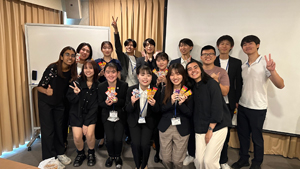 With SUSS students |
|
I presented about Japan’s free school lunch system and the famous anime culture. To prepare my presentation, I had to do a lot of research about Japan and Singapore. There were many things I didn’t know even about my country. I found that, in Japan, students not only acquire academic ability through school education, but also gain their morals or learn the way to control their health condition, both mentally and physically. The school lunch system is a good example. They learn about nutrition and manners, and in addition, they grow healthier thanks to the help of professional nutritionists who plan the meals. The Japanese government’s policy is that school lunches should be provided for every student regardless of their economic conditions, and thus more and more municipalities provide it for free. Before attending the JENESYS programme, I thought it might be the same in Singapore, but it was not.
I also acquired the ability to clearly express myself. Before visiting Singapore, I often found it quite difficult to convey my thoughts to others. I might have been worried too much about how they feel about mine. During this programme, I had many chances to talk to people in Singapore, especially university students. Some of them were younger than me, but all of them openly shared their own opinions. I’m sure this ability is needed by society. Now, I am aware that I need not be so concerned if my own idea is correct or not. Rather, what I need to do is to clearly explain the situation that I face. Why am I worried about something? What creates such situations? I learned that explaining those things helps us a lot. What is your impression of the Singaporean students whom you met during the exchange programme, and what did you learn from them? The people whom I met during this programme were so kind and compassionate. While on the programme, I joined a nature-walk, and the professor taught us many things related to nature in Singapore. The Singaporean students kindly accompanied us and kept communicating with us while walking. When the professor used some difficult words, they explained them to us using simpler English words. Such kindness touched me. If I visit other countries and be nice to people there, they might feel that Japan is a nice country. What I mean here is that we can be our country’s face anytime and anywhere. In other words, we can easily change our countries’ image. I’d like to meet many people from both inside and outside of Japan in my lifetime, and be as nice as possible to them. Have you ever been to Singapore before? This visit was my first time. I had previously transited at Changi Airport, and since then, I had desired to visit. I enjoyed lots of things this time like food, culture and interaction with people. What was your impression of Singapore before participating in the JENESYS programme? After the programme, did your impressions change? |
|
Before visiting Singapore, I imagined that this country was a developed country without much nature because the media often filmed the Marina Bay area. However, during this visit, I enjoyed both developed and nature areas. In Singapore, people consider nature and animals just as important as people. I believe this way of thinking should be shared all over the world.
What was the most enjoyable or impressive experience you had during your visit to Singapore in the JENESYS programme? Interacting with the SUSS (Singapore University of Social Sciences) students. As mentioned, they were always kind to us. We are around the same age, so we enjoyed our personal talks. We exchanged our SNS accounts, so our relationships continue. Do you have any Japanese culture/place to recommend to Singaporeans? Why? I recommend Shirakawa-go in Gifu. Even though I’ve only been there once with my family when I was in elementary school, I still cannot forget it. You can enjoy a traditional view of Japan there. If you wish to see snow, I also recommend visiting Tateyama in Nagano. It snows a lot in winter, and it’s famous for its bus tour whereby the bus drives between snow walls that are as high as twenty metres. Tell us more about the daily life of Japanese university students. I’m majoring in education, and now, I’m studying hard to get a teacher’s license. Usually, university students take classes four to five days a week. They have more free time than high school students, so they enjoy club activities, engage in volunteer work, or do part-time jobs. I belong to “Frontier School” and support junior high school students. One thing different from Singapore is that many students live alone. In Japan, it is normal to go to a university which is far from their family house, and universities support those students in many ways. |
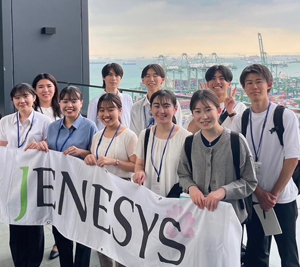 JENESYS members  Snow wall in Tateyama, Nagano 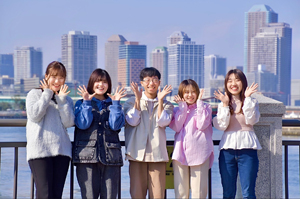 Frontier School members in Tokyo |
|
Any advice to Singaporean students interested in studying in Japan?
There are many kinds of classes for students with various levels of Japanese language ability in Japanese universities. In my university, Okayama University, you can choose classes from three levels; the beginner level, daily conversation level, and high level of Japanese ability which you can use when you study in the same course together with native Japanese. Not only classes, but there are many other chances to learn and practise Japanese. For instance, we have language café, which anyone can join. In Japan, students come from not only Asian countries, but European, African or American countries, too. It is certainly a good chance for you to meet people and it might change your life for the better. What I want to say is that you don’t need to worry about university life at all. Studying abroad is one of the best ways of studying, so if you have a chance, just take it! I’m really looking forward to seeing you in Japan. Tell us about your future plans/dream. |
| I have a desire to be engaged in something that can make a difference to children’s lives for the better. When I visited Thailand, I met a little boy who was working as a street vendor. In some countries, many children cannot study because of their economic difficulties or other problems in their environment. I’m still not sure what I should do. To look for the answer, I’ve just started a project named “global project”. (You can visit our Instagram if you are interested: @global_project_2024.) I also hope to become a Japanese teacher in foreign countries. After doing those things, I’d like to become an English teacher in Japan someday. By having many kinds of experiences, I believe I will be able to broaden my horizons and be sympathetic toward my students. | 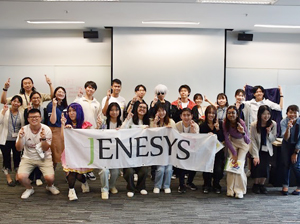 Cultural exchange with SUSS students |
|
Any message or hope towards the relationship between Japan and Singapore?
Both Japan and Singapore are developed countries, and face similar problems such as low birthrate and an aging society. I hope we can join forces to overcome such difficulties. This programme allowed me to meet many people, and I hope the relationships will continue. |
* All photos used in this article are provided by the author unless otherwise stated / © Ms Ayana Yamashita
|
Japan Creative Centre 4 Nassim Road, Singapore 258372 +65 6737 0434 / jcc@sn.mofa.go.jp https://www.sg.emb-japan.go.jp/JCC/ Nearest parking at Orchard Hotel & Delphi Orchard |
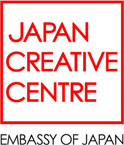 |